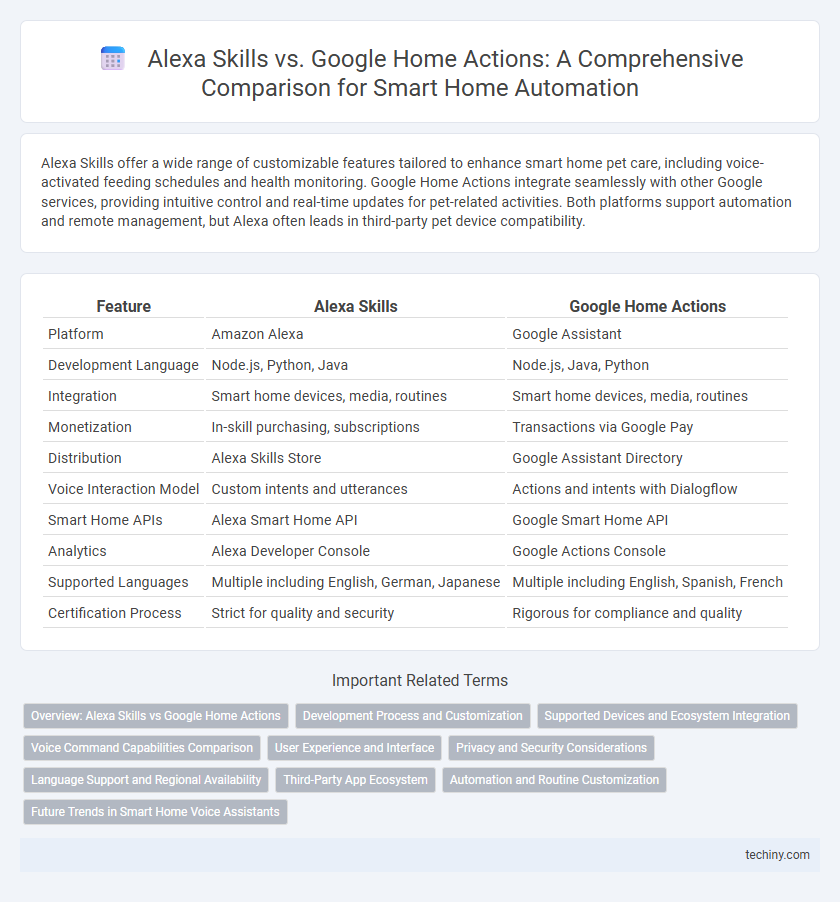Alexa Skills offer a wide range of customizable features tailored to enhance smart home pet care, including voice-activated feeding schedules and health monitoring. Google Home Actions integrate seamlessly with other Google services, providing intuitive control and real-time updates for pet-related activities. Both platforms support automation and remote management, but Alexa often leads in third-party pet device compatibility.
Table of Comparison
| Feature | Alexa Skills | Google Home Actions |
|---|---|---|
| Platform | Amazon Alexa | Google Assistant |
| Development Language | Node.js, Python, Java | Node.js, Java, Python |
| Integration | Smart home devices, media, routines | Smart home devices, media, routines |
| Monetization | In-skill purchasing, subscriptions | Transactions via Google Pay |
| Distribution | Alexa Skills Store | Google Assistant Directory |
| Voice Interaction Model | Custom intents and utterances | Actions and intents with Dialogflow |
| Smart Home APIs | Alexa Smart Home API | Google Smart Home API |
| Analytics | Alexa Developer Console | Google Actions Console |
| Supported Languages | Multiple including English, German, Japanese | Multiple including English, Spanish, French |
| Certification Process | Strict for quality and security | Rigorous for compliance and quality |
Overview: Alexa Skills vs Google Home Actions
Alexa Skills and Google Home Actions serve as voice-activated applications that enhance smart home functionality by enabling users to control devices, access services, and automate tasks via their respective platforms. Alexa Skills, developed for Amazon Echo devices, offer a vast ecosystem with over 100,000 skills, emphasizing compatibility with a wide range of smart home brands and seamless voice interaction using natural language understanding. Google Home Actions integrate with Google Assistant, leveraging advanced context awareness and machine learning to provide personalized responses and broad device support, making them essential for users embedded in the Google ecosystem.
Development Process and Customization
Developing Alexa Skills involves using the Alexa Skills Kit (ASK) with support for AWS Lambda, offering tools like Skill Blueprints for customizable templates and Alexa Presentation Language for rich visual interfaces. Google Home Actions development leverages the Actions on Google platform, utilizing Dialogflow for natural language processing and allowing fulfillment through webhook services, emphasizing integration with Google Assistant's capabilities. Alexa Skills provide more granular control over voice interaction design, while Google Home Actions offer seamless integration with Google services and easier content updates via Dialogflow's intuitive interface.
Supported Devices and Ecosystem Integration
Alexa Skills support a wide range of devices including Amazon Echo, Fire TV, and third-party smart home gadgets, offering deep integration with Amazon services like Prime Music and shopping. Google Home Actions are designed for Google Nest devices and other compatible smart products, leveraging Google's ecosystem such as Google Assistant, Google Calendar, and Chromecast. Both platforms provide extensive ecosystem integration but differ in device compatibility and native service connectivity, influencing user experience and automation capabilities.
Voice Command Capabilities Comparison
Alexa Skills offer extensive voice command capabilities with deep integration into Amazon's ecosystem, allowing complex multi-turn conversations and custom routines. Google Home Actions leverage Google Assistant's powerful natural language processing and contextual understanding to deliver dynamic, conversational interactions and seamless control of smart devices. Both platforms support voice commands for device control, but Alexa emphasizes skill-specific customization, while Google prioritizes conversational AI and contextual responsiveness.
User Experience and Interface
Alexa Skills offer a highly customizable user experience with multi-turn conversational capabilities and extensive voice command variations, enhancing interaction fluidity. Google Home Actions emphasize natural language understanding and seamless integration with Google Assistant's ecosystem, providing intuitive and context-aware responses. Both platforms prioritize ease of use, but Alexa's interface supports broader third-party customization while Google excels in contextual and localized assistance.
Privacy and Security Considerations
Alexa Skills and Google Home Actions offer unique privacy and security frameworks tailored to their ecosystems. Alexa Skills require explicit user permissions for data access and incorporate voice recognition safeguards, while Google Home Actions emphasize data minimization and transparent user consent processes. Both platforms continuously update security protocols to address vulnerabilities, ensuring user trust in smart home integrations.
Language Support and Regional Availability
Alexa Skills support over 20 languages including English, German, Spanish, and Japanese, enabling global reach across North America, Europe, and parts of Asia. Google Home Actions offer support primarily in English, French, German, Japanese, and Spanish with expanding availability in the US, Canada, UK, Australia, and select European countries. Regional restrictions and language compatibility significantly impact developer strategy and user adoption for both platforms in the smart home ecosystem.
Third-Party App Ecosystem
Alexa Skills boast a robust third-party app ecosystem with over 130,000 skills available, enabling extensive device compatibility and diverse user experiences. Google Home Actions, integrated with the Google Assistant ecosystem, provide seamless access to thousands of third-party apps and services through the Google Actions Console, emphasizing natural language processing and contextual understanding. Both platforms support continuous updates and developer-friendly tools, but Alexa's longer market presence results in a larger, more mature app ecosystem.
Automation and Routine Customization
Alexa Skills offer extensive automation capabilities, allowing users to create highly personalized routines that integrate seamlessly with a wide range of smart home devices. Google Home Actions provide robust routine customization, leveraging Google's contextual understanding and AI to automate tasks based on user habits and environmental triggers. Both platforms support complex automation workflows, but Alexa's Skills ecosystem tends to offer deeper device compatibility and more granular control for tailored smart home experiences.
Future Trends in Smart Home Voice Assistants
Alexa Skills and Google Home Actions are rapidly evolving to integrate advanced AI capabilities, enabling more natural and context-aware interactions in smart home environments. Future trends include deeper personalization through machine learning, enhanced multi-modal experiences combining voice with visual displays, and expanded interoperability across diverse smart devices and ecosystems. These advancements position voice assistants as central hubs for seamless and intuitive smart home control, driving increased user engagement and automation sophistication.
Alexa Skills vs Google Home Actions Infographic

 techiny.com
techiny.com